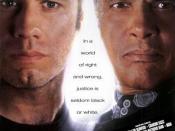Motivation consists of internal forces that initiate a certain behavior and determine its intensity, direction, and duration. Equity theory bases its principles on the concept that individuals in the workplace will compare their ratio of rewards to inputs to the jobs of others inside and outside of their organization as to eliminate any inequities. The theory assumes that people's motivation in an organization is based on the desire achieve equality and fairness. When the output/input ratio is viewed as comparable, the equity is perceived as attained and the equilibrium is found. However, when a worker perceives inequality, she/he is motivated to achieve equality by increasing or decreasing inputs or outputs, distorting the perception of self or the referent, changing the comparison individual, or leaving the organization.
The inequity can be seen in two different ways - distributive and procedural. Distributive justice is concerned with the overall fairness in distribution of the rewards and procedural tends to concentrate on the fair process of distribution of the rewards.
Imbalance in either of the facets will result in lowered motivation and an overall decrease in organizational effectiveness, because the link between performance and reward is weakened.
Although employees are accepting of overpayment, they still often subconsciously, strive to bring about equity. However, the negative effects of over-compensation are incomparable to the very severe impact that under-compensation can have on organizational effectiveness, or how well an organization operates. As a result, the employee is less motivated to adequately perform the assigned job and will have lower productivity rate, job satisfaction and higher absenteeism, which are all determinants of organizational effectiveness. An hourly worker will respond to under-compensation by either producing less, or lowering the quality of the product and the worker who is paid by quantity will try to increase the throughput by decreasing...



Good
Odd use of analogy but otherwise good piece.
1 out of 1 people found this comment useful.